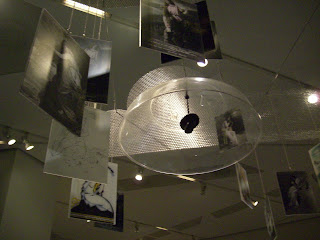Alain Badiou. Beckett, l'increvable désir.
Try to understand this--what you being saying you being doing--as you create new structures, swallow new structures. Just a little disorder, an old building. Du bist kein Philosoph.

These days you have bad luck with Modern Art. Das ist ein Witz, und nicht.
You follow the signs, follow the names, follow the path. And yet you cannot hear. Not even with your eyes. Es tut mir leid, Nietzsche, kann ich (will ich) nicht dich folgen--at least not now.
Leer. Mein Kopf ist. As if it was a condition. Manchmal. Le rapport entre l'art et le budisme. Néant. Always a blatant mistake. Just as the complete drunkness. Hard to think middle ways. Du lernst, immer noch, heute. Irwendetwas, una estructura. From where all your "thoughts" come--at least your thesis. Nicht wahr?
Take a lesson from the Tramp. À la poubelle, dès la poubelle. Was liest du jetzt? Molloy. Welche ist deiner Name? Molloy. But yet you have not bought a bicycle. Du musst. As the time when you rode down the hill up to that sign, where your bicycle crashed and your head was smashed against the wall. Erinnerst du dich an? Daran?
Noch einmal, bitte? Was siehst du in dem Bild? Two lines, ganz einfach. The same two lines that you'd see from (inside) your grave, the same two lines that mark the rhythm, the same two lines of the sounds coming in and out, the same two lines of your bed, your height, your cigarette and the Strasse... und so weiter und so weiter... Ah, so nah!
Puntuación. Der Punkt ist ein Loch. You always thought of the point as a whole. (Even before Kandinsky or Freud for that matter). And it was really hard to you to understand a "punto y a parte", the end of a paragraph, or even of a sentence. Sogar. You still have problems with it. This time you decided to make it bigger, let what is below come upstairs. Licht. Leicht sein, Licht sein. What do you perceive? Musik? Noch einmal. Ja, toi toi.
Go back to what you know, Marteau. Was? "mes rêves, même nos rêves sont des cauchemars." "La porte de l'enfer..." Prende une photo de la photo. Ohne graphie. As you know all this story, all history. "En México pasa todo y nada pasa" sagte dein Vater. Also, keine Geschichte. Le pays sans histoire, et encore. 'Immer' and 'toujours' two terms that you had a lot of problems to understand. And yet. How do we enter in(to) history? Par la porte.
Silencio. Warum Berlin? Warum hier? Du weiss. As you had a problem with Deleuze's theory of the face. Rostro. Diese schwarze Augen. Your black eyes. Doesn't matter how you look, you have always seen them dark. Trauma noch einmal. Vielleicht etwas, dass du als Kind gesehen hast. What did you see? And did you hear? That was the point. Punktlich, noch einmal. Even with a headache. Or a headaxe. Now again, where are you? Move the lens, move the eye, move the feet and take the picture (you hear a thunder now, 12.35 am, 23 June, 2009). For one second you thought, you were able to think in... Geschichte. Nein, Tod. Ja. Ganz simple.
Write and write, keep failing. After all, yes, after all. Falling. Falsch.
Look--as always--at the window. Was ist das Lied?
"Ich weiss nicht was soll es bedeuten / Dass ich so traurig bin; / Ein Märchen aus alten Zeiten, / Das kommt mir nicht aus dem Sinn." H.H. 1823.
I don't know what that should mean, that I am so sad...
Noch?
Nein eigentlich.
Warum?
je sais pas.
¿Escuchas? ¿Qué?











































Keine Kommentare:
Kommentar veröffentlichen